

BANDON'S HISTORY
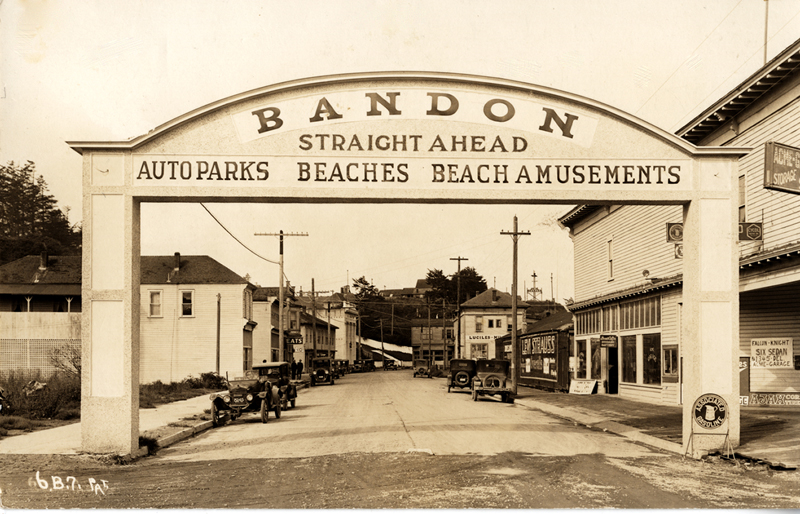
Above is a postcard of Bandon from 1928 showing the welcome
arch on Second Street.
Notice the building at the far end on the left. It still stands
today.
A Local History Timeline from the Bandon History Museum
Long ago, people lived in communities along the estuary and on the banks of the Coquille River. They raised families, forged traditions and engaged in wide ranging commerce. (Archeological evidence traces several thousand years of continuous habitation.)
1000 CE The people living along the Coquille river used weirs in the rivers to harvest salmon and pits to capture elk. they built plank houses, traveled the river in canoes, and lived in extended family groups.
| Date | Events |
| 1700 | A major earthquake and tsunami strike the coast. Oral histories from British Columbia to norther California recall the event. Tsunami records in Japan pinpoint the year. The people recover and rebuild. |
| 1700s | Trade goods from Europe and Asia enter the local economy. |
| 1826 | Villagers along the Coquille River trade furs with trappers led by Alexander McLeod from the Hudson's Bay Company. |
| 1828 | The Na So Mah people have an unpleasant encounter with a party of Americans at the mouth of the river (as recorded by leader Jedediah Smith in his journal entry for July 3, 1828). The Smith party has a practice of dismantling plank houses to use as rafts and of plundering Indian settlements for furs and supplies. |
| 1848 | The Coquille River Valley is claimed by the United States as part of the Oregon Territory. |
| 1851 | American soldiers from Fort Orford on an expedition to "chastise" the Indians fire cannon at the plank houses of the Na So Mah village, killing several residents. |
| 1853 | Gold is discovered at Whisky Run Creek. At least 1,000 miners congregate at the new town named Randolph. Indians become the target of hostilities. |
| 1854 | Forty vigilantes from the mining camps attack Coquille villages on January 28, 1854. They kill fleeing villagers and burn the Indians' houses. |
| 1855 | Headmen of various Coquille villages sign a treaty, ceding their land in exchange for promised government protection and benefits. Congress never ratifies the treaty. |
| 1856 | The US government transports the Coquilles and other coastal natives to reservations. |
| Late 1850s and 60s | Immigrants including John Hamblock, Edmund Fahy, Adam Pershbaker, Thompson Lowe, Chris Long and Judah Parker file donation land claims and establish communities along the river. |
| 1859 | The local area becomes part of the State of Oregon on February 14, Oregon's birthday. |
| 1873 | George Bennett from Bandon, Ireland purchases ocean front land from Thompson Lowe's donation land claim and envisions a town he calls Bandon Beach. |
| 1877 | A Bandon Post Office is established. |
| 1880 | 1880 Census: population is 175 (*source: www.population.us) |
| 1880 | Cheese-making began and Congress appropriated money for the jetty. |
| 1884 | The Army Corps of Engineers begins construction work on Bandon's jetties. |
| 1886 | School District #54 established. |
| 1887 | William Averill and George Dyer plat a town along the bay that they name Averill. |
| 1890 | 1890 Census: population is 219.* |
| 1891 | City of Bandon is incorporated February 18, 1891. |
| 1893 | Woolen Mill established. |
| 1896 | The Coquille River Lighthouse begins service. |
| 1897-98 | Jetty constructed on Coquille River. |
| 1900 | 1900 Census: population is 645.* |
| 1908 | Fire destroys the Cody sawmill. The mill is rebuilt and the company reorganizes as the Moore Mill and Lumber Company. Moore Mill would be the community's largest employer for several decades. |
| 1910 | 1910 Census: population reaches 1,803.* |
| 1910 | Electric service begins in Bandon. |
| 1912 | Voters approve funds to buy the property for Bandon's City Park. |
| 1914 | A fire breaks out in a restaurant kitchen and destroys three blocks of downtown buisinesses. |
| 1916 | The steam schooner Fifield wrecks on the Coquille River bar February 29, Leap Day. Shipwrecks are a frequent occurrence on the local coast. |
| 1918 | Locals form a home Guard to protect the town during World War 1 and federal Spruce Division troops are stationed on the Coquille River to harvest lumber for airplanes. |
| 1920 | 1920 Census: population is 1140.* |
| 1925 | The Wecoma baths, an indoor, salt water swimming pool is opened on Coquille Point. |
| 1926 | A "Welcome" arch is built to greet drivers on the newly constructed Roosevelt Highway, later renamed Highway 101. |
| 1927 | Bandon's first golf course is built and named Westmost, because it is the western most golf course in the United States at that time. |
| 1930 | 1930 Census: population is 1516.* |
| 1936 | A forest fire sweeps through Bandon September 26, 1936, destroying approximately 80 percent of the town. Eleven people die in the fire. |
| 1937 | Bandon begins rebuilding. |
| 1939 | The Bandon Lighthouse is decommissioned (replaced by an automated beacon on the South Jetty) and the lighthouse keeper's house is abandoned. |
| 1940 | 1940 Census: population is 1004.* |
| 1942 | First dog patrols and the horse patrols are quartered in Bandon's City Park as Bandon is fortified during World War 2. "The Barn" for the horses would later become the heart of Bandon's community building in the park. |
| 1947 | Bandon holds its first "Cranberry Festival," an annual fall event that continues to this day. |
| 1950 | 1950 Census: population is 1251.* |
| 1950 | Bandon High wins a state football championship. |
| 1953 | The lumber ship Oliver Olson goes aground on the south jetty. Rather than attempting to refloat the 300-foot-long ship, the hull is cut to the water line and filled with rock to extend the jetty. |
| 1954 | The Bullards bridge opens, ending years of ferry service across the Coquille River. |
| 1960 | 1960 Census: population is 1653.* |
| 1961 | A new section of Highway 101 opens and connects Bandon directly to Coos Bay (without traveling through Coquille). |
| 1962 | The state begins acquiring land for Bullards Beach State Park. |
| 1960s | Trees, cheese and cranberries are the mainstays of Bandon's economy. |
| 1970 | 1970 Census: population is 1,832.* |
| 1974 | An arson fire destroys Bandon High School. |
| 1980 | 1980 Census: population is 2,311.* |
| 1986 | The Coquille Tribe is restored as a federally recognized tribe. |
| 1980’s | Old Town area is re-developed, new boat basin and shopping in East Bandon constructed. |
| 1990 | 1990 Census: population is 2,267.* |
| 1991 |
Bandon celebrates its centennial as an incorporated city with year-long festivities. |
| 1999 | Bandon Dunes Golf Resort opens its first 18-hole course. |
| 2000 | 2000 Census: population is 2,997.* |
| 2000 | The Sprague theater, in Bandon City Park, has a grand opening in May. |
| 2004 | A new public library building is opened in City Park. |
| 2010 | 2010 Census: population is 3, 066.* |
| 2013 | Face Rock Creamery opens, bringing local cheesemaking back to the community. |
| 2020 | Bandon Dunes Golf Resort opens its fifth 18-hole course, Bally Bandon Sheep Ranch. |
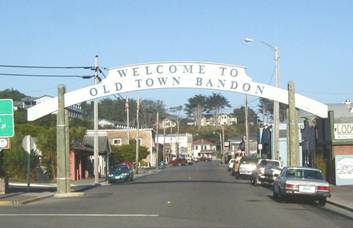
View of welcome arch on Second Street in August, 2002. Note that the building at the end on the left is the same as in the picture at the top of this page.
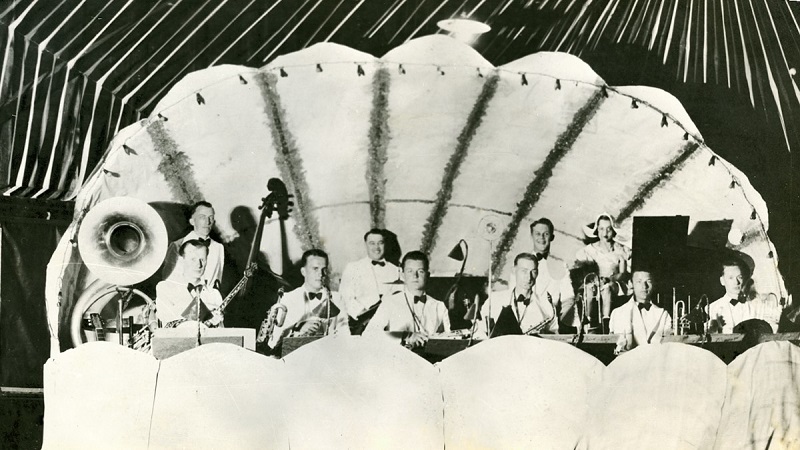
Learn about Bandon's Silver Spray Gardens dance pavilion, a pleasure palace that may have been the most exotic and celebrated tourist establishment in Oregon.Read About It!
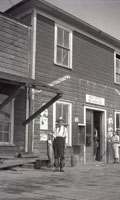
This is a first person account of growing up in Bullards, Oregon. Learn more about Lester Bundy, Bullards Post Offfice and Store and the Bullards ferry.Read About It!
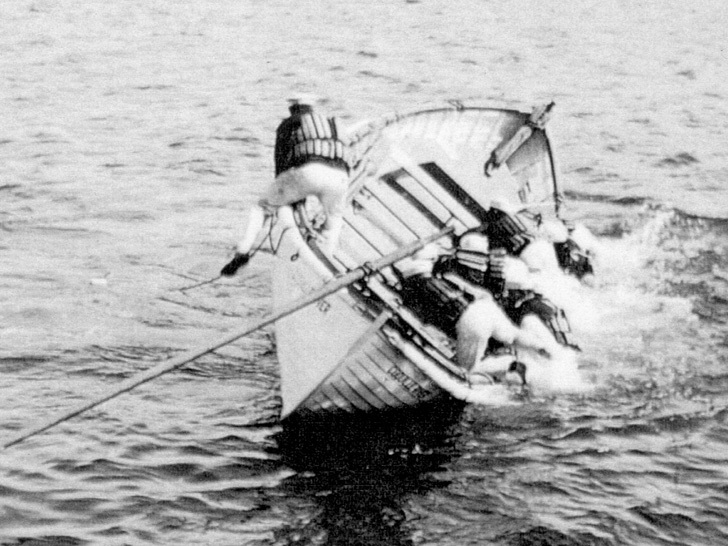
Art Dobney shares some of his memories from his Coast Guard service in Bandon.Read About It!
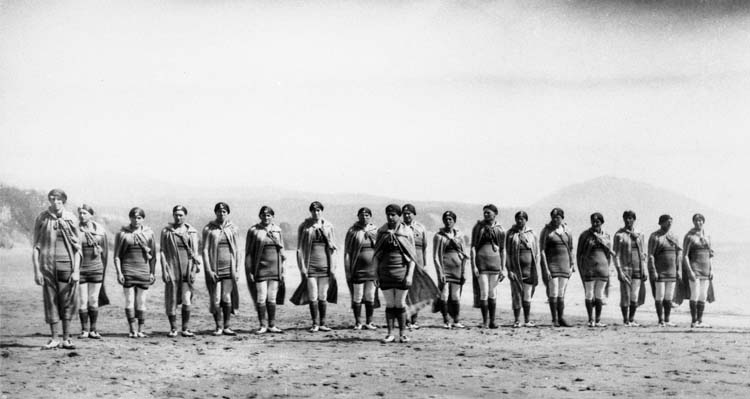
Though officially "The Beachmen," the group more popularly known as the "Sons of the Beaches" were recruited from and sponsored by Bandon's Chamber of Commerce.Read About It!

George Bennett's first trip down the Coquille River with his two sons was an adventure that became the beginning of Bandon.Read About It!
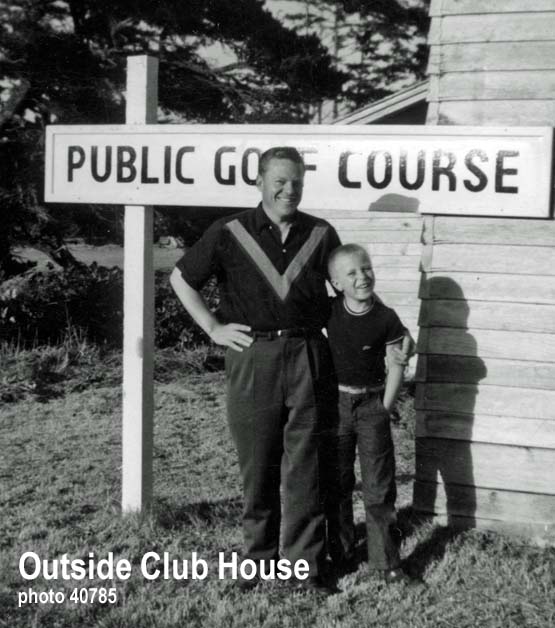
Proposed in 1927, the golf course farthest west in America was officially opened in June 1928.Read About It!
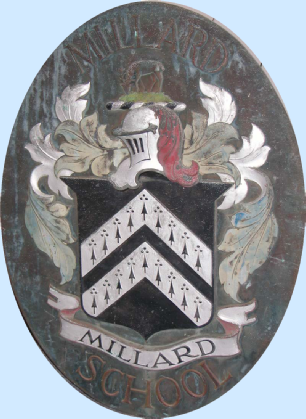
Founded in 1953 on Langlois Mountain the school moved to Bandon in 1962. Its last class to graduate was in 1981.Read About It!

4000 people enjoyed the free fish fry sponsored by the Bandon Chamber of Commerce.Read About It!
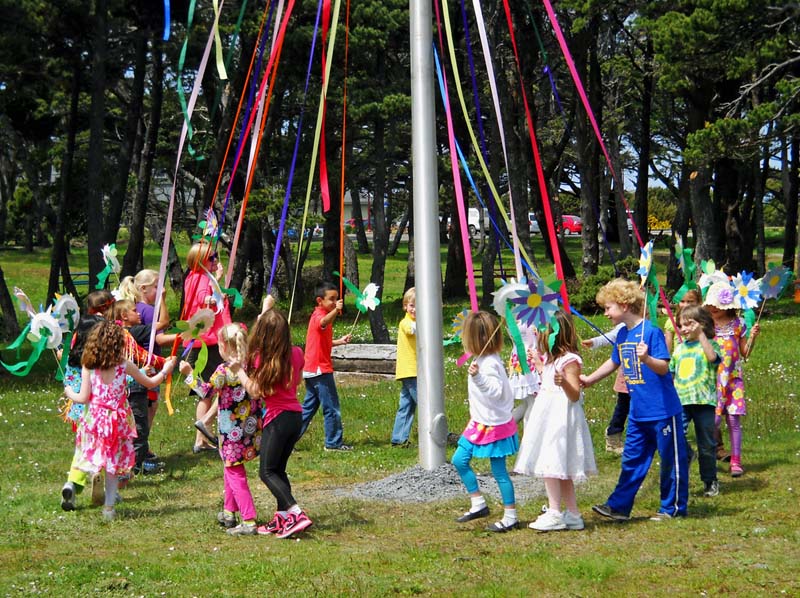
May Day is not widely celebrated in Bandon any more, but the museum has a trove of information about May Day celebrations in the past. Read About It!

Heated, indoor swimming was a highly anticipated event in Bandon in the summer of 1925.Read About It!
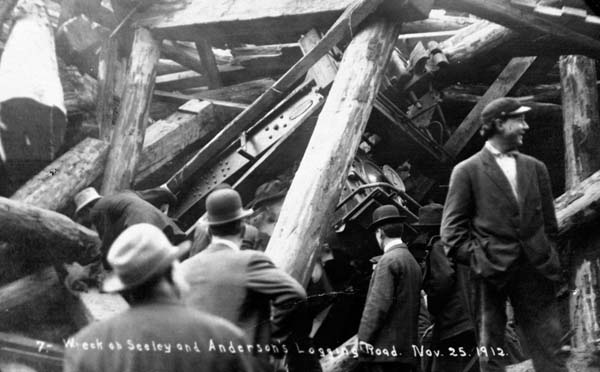
Bandon never had a rail connection with the outside world, however, a horrific logging railroad accident made headlines in 1912. Read About It!